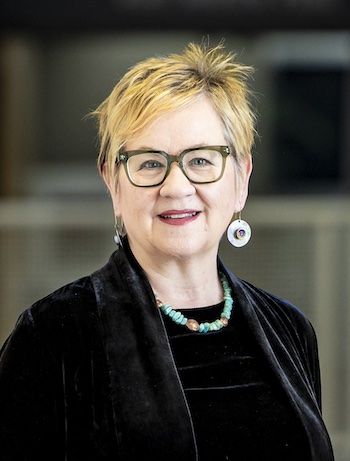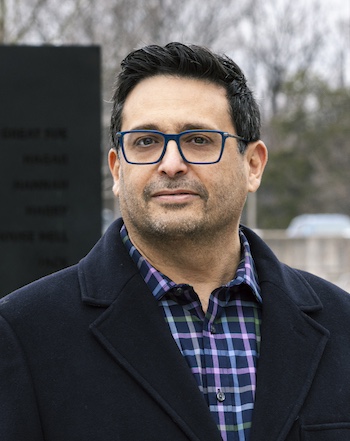Two George Mason University faculty members received year-long grants from the National Endowment for the Humanities (NEH), part of 260 grants worth $33.8 million from the NEH this year for humanities projects across the country.

Jo-Marie Burt, an associate professor in the Schar School for Policy and Government, was awarded a $60,000 fellowship to further her research for a book she will write that examines four war crimes trials that took place in Guatemala between 2013 and 2022.
Arthur Romano, an associate professor in the Jimmy and Rosalynn Carter School for Peace and Conflict Resolution, was awarded $148,022 for the recovery of documentation and to collect oral histories of racial violence in Forsyth County, Georgia, for the purpose of creating educational materials, a video library, and an online viewing portal.
“Very happily surprised,” Romano said of the grant.
Said Burt, “I jumped up and down for quite a long time.”
Though their research of consequence is focused on different parts of the world, Burt and Romano will investigate something similar: accountability.
For Romano, it is an opportunity to hear the voices and recollections of those whose families were part of a Black community outside Atlanta, and were driven out by terrorizing White mobs in 1912.
For Burt, who previously wrote a book about political violence and authoritarianism in Peru, it is a chance for another deep dive into a Latin American country besieged by internal armed conflict, with the military, she said, primarily responsible for the violence.
“I believe that impunity, in other words the failure to investigate or prosecute those responsible for those abuses, erodes democracy,” Burt said. “It erodes the social contract. It perpetuates the idea that some people are less citizens, are less worthy than others.”
It’s not so much about relitigating the past, Romano said, as it is, in the case of Forsyth, Georgia, about giving voice to descendants of the victims. Romano's co-principal investigator is Margarita Tadevosyan, executive director of Mason's Center for Peacemaking Practice. The stories they record will be housed at the Truth Telling Project, which, among other things, helps document the impacts violence has on families and communities.

While there has been some reporting about what went on in Forsyth, Romano said the incident has been under-researched. He said his inquiry will provide descendants “the space to grieve and share their experiences without a media spotlight on it, where people can just share about the ways they are hurting and what they’re hoping for in the future.”
Romano is the founder of the Carter School’s Program on Urban Peacebuilding, and his book Racial Justice and Nonviolence Education is about ways to disrupt cycles of violence by recognizing that people impacted by violence can be effective educators.
For me, that’s a big part of what this is all about,” he said. “Not only understanding past harms, but what are the echoes of that and how it affects who we are today. It’s part of building a framework of repair and reconciliation for us to be able to function better and be better together and actually live out the values we hope to build.”
Burt said she has been interested in human rights violations in Latin America since college. Her book Silencing Civil Society: Political Violence and the Authoritarian State in Peru came out in 2007, the same year former Peruvian president Alberto Fujimori went on trial for corruption and human rights abuses committed from 1990 to 2000.
Burt attended the first week of the Fujimori trial with the help of a Mason grant. She then secured a grant from the Open Society Foundation to monitor the trial in its entirety. Fujimori was found guilty and sentenced to 25 years in prison, an outcome regarded as a historic ruling for international justice.
Her research in Guatemala will include the trial of retired army general Jose Efraín Ríos Montt, who came to power in a military coup in March 1982. Human rights organizations estimate 10,000 people were killed in the first three months of his government, which remained in power until August 1983. Ríos Montt was convicted of genocide and sentenced to 80 years in prison, though higher courts nullified the proceeding.
“These are crimes that occurred many years ago, but they’re not in the past,” Burt said. “Especially for the victims, they are very much in the present.”
And also, in a way, for Burt.
I just got hooked into this dynamic of searching for justice, for accountability, for mass atrocity crimes,” she said. “Can trials, which normally focus on perpetrators’ needs, take into account the victims’ needs, perspectives, and rights? Over the years, I began to think about trial monitoring not just as a research tool but as a tool to support and advocate on the behalf of victims.”
In This Story
Related Stories
- December 16, 2024
- April 3, 2024
- February 13, 2024
- November 14, 2023
- November 10, 2022
